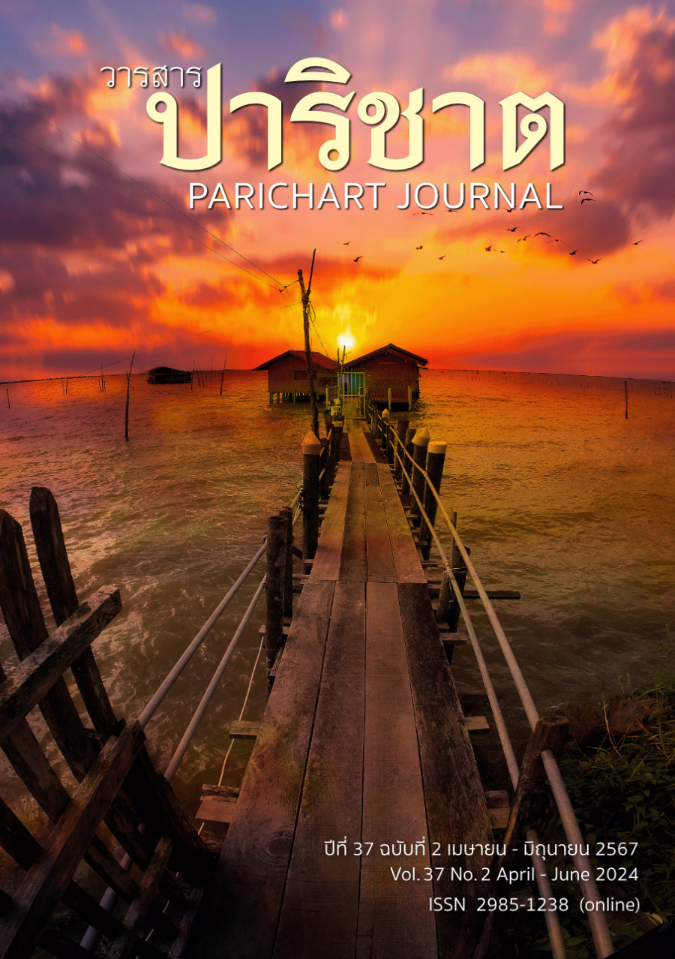Revolutionary Learning Management to Foster Global Future Skills
Main Article Content
Abstract
This article proposes a revolutionary learning management designed to foster global future skills by means of blending advanced educational concepts, future-oriented world skills, and futuristic learning methods. This approach necessitates a transformation from traditional learning management formats and methods to a new one, which emphasizes learner-centered processes and encourages learners to develop their essential skills across four key dimensions: 1) knowledge, 2) skills, 3) attributes, and 4) values. These dimensions also take cognitive, social-emotional, and digital technology skills into account with a focus on diverse learning activities. The transformation empowers scholars, education personnel, and others involved to be able to intentionally design learning management formats and methods that will keep pace with changes and foster necessary skills in an increasingly volatile and complex world. It significantly contributes to the development of digital citizenship as well. The appropriate transformation can enable learners to efficiently develop their essential skills for the future workforce.
Article Details

This work is licensed under a Creative Commons Attribution-NonCommercial-NoDerivatives 4.0 International License.
References
Thailand Development Research Institute (TDRI). (2018). TDRI report: Steering the Thai economy towards the era of technological disruption readiness. https://tdri.or.th/2018/09/reorienting-the-thai-economy-to-prepare-for-the-age-of-technologicaldisruptions
McCollum, S .B. (2014). Youth life skill development for 21st century workforce preparedness. [Doctoral dissertation, North Carolina State University]. North Carolina State University Library. https://repository.lib.ncsu.edu/server/api/core/bitstreams/f3b21a87-d2dc-4545-a032-b821ba51a805/content
Office of the Education Council. (2018). The state of Thai education 2016/2017: Thai education reform directions towards Thailand 4.0 era. https://www.onec.go.th
Metiri Group. (2003). enGauge 21st century skills for 21st century learners. https://www.researchgate.net/publication/234731444_enGauge_21st_Century_Skills_Digital_Literacies_for_a_Digital_Age
Buarod, B. (2014). Skills of the future: 21st century learning. Journal of Information, 13(1), 39-49.
Research and Development Office, Office of the Secretary of the Education Council. (2023).Developments in Thai education and global education. https:// backoffice.onec.go.th/uploads/Book/2071-file.pdf
Schwab, K., & Zahidi, S. (2020). The future of jobs report 2020. https://www.weforum.org/publications/the-future-of-jobs-report-2020/in-full
Schwab, K., & Saman. (2016). The global competitiveness report 2016-2017. https://www.astrid-online.it/static/upload/wef_/wef_theglobalcompetitivenessreport2016-2017_final.pdf
Li et al., (2020). Does urbanization intensify regional water scarcity? Evidence and implications from a megaregion of China. Journal of Cleaner Production. 244(2020), p. 118592. https://doi.org/10.1016/j.jclepro.2019.118592
Ratanawaraha, A. (2020). Future studies (2nd ed.). Chiang Mai: Spearhead plan for social strategies on Thais 4.0. Login Design Network.
Bell, W. (1974). Social science: the future as a missing variable. In A. Toffler (ed.), learning for tomorrow: the role of the future in education. New York: Random House.
Bell, W. (1997). Foundations of futures studies: Human science for a new era. Transaction Publishers.
Thailand Development Research Institute (TDRI). (2018). TDRI report: Steering the Thai economy towards the era of technological disruption readiness. https://tdri.or.th
Navagitpaitoon, N. (2012). What is performance? https://www.gotoknow.org/posts/501770
Kay K. (2019). What are 21st century skills, why are they important, and how can they be successfully developed? In James Bellon's command and control. New future skills: Education for the 21st century, pages 30-54. Translated by Worapoj Wongkitrungruang and Atip Jittaruruk (3rd ed.). Book Cape.
Bakhshi, H., Downing, J., Osborne, M., & Schneider, P. (2017). The future of skills: Employment in 2030. Pearson and Nesta.
World Economic Forum (WEF). (2015). The skills needed in the 21st century. https://widgets.weforum.org/nve-2015/chapter1.html
OECD Future of Education and Skill 2030. (2019). OECD future of education and skills 2030: Conceptual learning framework. https://www.oecd.org/education/2030-project/contact
Mangkhang, C. (2022). Intelligence in teaching social studies. Lanna Printing.
Patisonthicharoen, R., Yousorn, C., & Ponathong, C. (2020). Needs assessment of future work skills for students at autonomous universities. Journal of MCU Peace Studies. 8(6), 2377-2391.
National Innovation Agency. (2022). Future of learning. https://ifi.nia.or.th/wp-content/uploads/2022/01/NIA-x-FTL-2021-Future-of-Learning.pdf
Shulman, L. S. (1986). Those who understand: Knowledge growth in teaching. Educational Researcher. 15(2), 4-14.


